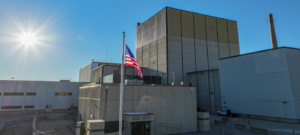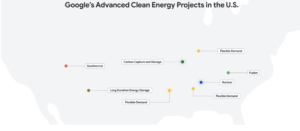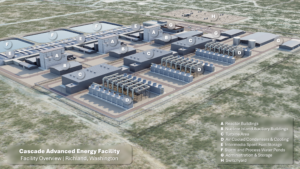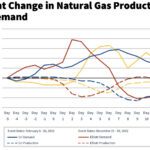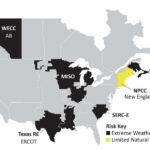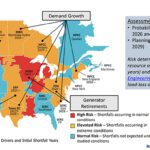The North American Electric Reliability Corp. (NERC) is warning that much of the central U.S.—a region that stretches from the Great Lakes into southern Texas—may face critical power deficiencies during extreme winter weather conditions over the next three months. Natural gas supply disruptions and low hydropower conditions could also imperil power reliability in New England and the West, it said.
In its Nov. 18–issued 2021–2022 Winter Reliability Assessment, the nation’s designated Electric Reliability Organization (ERO) urged generators across the U.S. to take proactive steps to prepare for an eventful winter and keep communications open with grid operators.
NERC also called on grid operators to prepare and implement cold weather operating plans, conduct drills, and poll generators for fuel and availability status. Load-serving entities should review critical loads to prevent disruptions, and regulators should support requested environmental waivers, it said.
A Cold, Hard Outlook
The ERO’s dire report echoes its May-issued summer assessment, when it warned of “elevated risks” for energy emergencies in Texas, New England, in the Midcontinent Independent System Operator (MISO) territory, and parts of the West. In its bulk power system (BPS) reliability assessment for the next three months—December 2021 through February 2022—NERC suggests extreme weather risks, including soaring peak demand or generator outages that exceed forecasts, “can be expected to cause energy emergencies” in regions that have previously suffered cold-weather reliability debacles. These include MISO, the Southwest Power Pool (SPP), and the Electric Reliability Council of Texas (ERCOT).
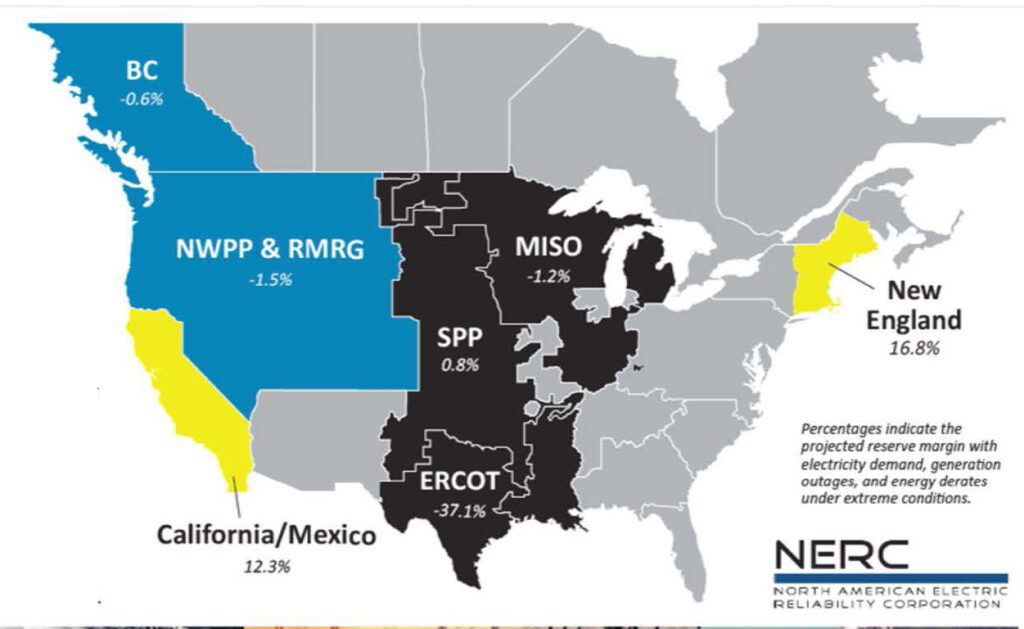
Natural gas supply disruptions, meanwhile, could affect “infrastructure-limited” areas, like ERCOT. And although New England, Southern California, and the Southwest have sufficient planning reserves, fuel supplies to generators in those regions may also face cold-weather vulnerabilities. New England, specifically, faces natural gas transportation constraints while Southern California and the Southwest have “limited natural gas storage and lack redundancy in supply infrastructure,” NERC said.
Continuing drought conditions in the West may also compound supply issues, threatening power transfers throughout the area. “Although resources are expected to be sufficient for peak demand, higher demand from more extreme temperatures in the Northwest could cause a shortfall. Low hydro conditions can reduce transfers needed to mitigate a wide area cold weather event,” NERC warned.
Generators Facing Multiple Challenges
Exacerbating the overall outlook is that generators are simultaneously fielding fuel and supply chain stress. While NERC doesn’t anticipate critical reliability issues, it urges owners and operators of coal- and oil-fired facilities to monitor their fuel stores.
Natural gas generators, meanwhile, should monitor their contracts “as late-stage acquisitions are less assured this winter,” it suggests. “Regional natural gas storage levels are below average as a result of natural gas infrastructure maintenance and high natural gas usage throughout the warm summer months,” it cautions. “In most assessment areas, natural gas reliance as a generator fuel has increased in recent years.”
New England, specifically, may face heightened supply issues because it competes for liquefied natural gas (LNG) supply on the world market. “Unprecedented high liquefied natural gas demand is anticipated for the upcoming 2021–2022 winter months,” NERC says. “These potential constraints could challenge many owners of fossil-fired plants over the winter and underscore the need for operators at the Balancing Authorities (BAs) and Reliability Coordinators (RCs) to include generator fuel surveying in their operating plans.”
Winterization Must Be a Priority
NERC noted that it has taken several steps since the four-day February 2021 crisis, when ERCOT, MISO, and SPP suffered unprecedented reliability crises. A 300-page final report on the freeze event, which NERC and Federal Energy Regulatory Commission (FERC) jointly issued on Nov. 16, notably highlighted “a critical need for stronger mandatory reliability standards, particularly with respect to generator cold weather–critical components and systems.” The report also called for better utilization of weather forecasts to better predict electric demand; increasing the ability to rotate rolling blackouts; guidance on identification of natural gas infrastructure for protection from rolling blackouts; and additional ways to address natural gas fuel supply shortfalls during extreme cold weather events.
NERC on Thursday also noted it had issued a Level 2 NERC Alert to grid operators and generators to help evaluate the BPS’s winter readiness. Responses suggest grid operators have put operating plans in place to reduce seasonal risks and maintain system reliability, NERC said. However, generator owners’ and grid operator’s responses to questions about winterization plans and fuel coordination “indicate that some plant vulnerabilities can be anticipated for the upcoming winter,” it said.
One telling parameter involves assessments provided by entities to NERC of generation capacity that would be unavailable due to extreme cold weather conditions. “The assessed unavailable capacity of the 197 [generator owners] that indicated they have no plans or partial plans to perform weatherization surveys is 23,850 MW,” NERC said. “The responses indicate the importance for grid operators to be prepared to implement their operating plans to manage potential supply shortfalls in extreme weather.”
This story is being updated
—Sonal Patel is a POWER senior associate editor (@sonalcpatel, @POWERmagazine).


